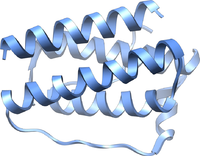
Photo from wikipedia
The placental tissue serves as an exchanger between the mother and the fetus during pregnancy in mammals. Proper placental angiogenesis is central to the health of both the mother and… Click to show full abstract
The placental tissue serves as an exchanger between the mother and the fetus during pregnancy in mammals. Proper placental angiogenesis is central to the health of both the mother and the growth and development of the fetus. Maternal obesity is associated with impaired placental function, resulting in restricted placental blood vessel development and fetal developmental disorders. Hydrogen sulfide (H2S) is a ubiquitous second messenger in cells that has many biological effects such as promoting angiogenesis, anti-inflammation, anti-oxidation and promoting lipid metabolism. However, in the case of maternal obesity, whether H2S can be used as an important signaling molecule to regulate body metabolism, alleviate placental inflammation levels and promote placental angiogenesis is still unclear. In this study, diallyl trisulfide (DATS), which is a well-known H2S donor, was derived from garlic and used to treat obese pregnant mice induced by a high-fat diet, to determine its effects on lipid metabolism and inflammation, as well as placental morphology and placental angiogenesis. Here, we show that DATS treatment increased litter size and alive litter size. DATS improved the H2S level in the serum and placenta of the mice. In addition, DATS treatment improved insulin resistance and lipid metabolism, reduced the inflammatory response and alleviated placental vascular dysplasia caused by obesity in obese mice. In summary, our research revealed that H2S is an important signaling molecule in vivo, which can regulate placental angiogenesis and improve the reproductive performance in maternal obesity. The addition of H2S donor DATS during pregnancy promoted placental angiogenesis by regulating lipid metabolism and alleviating inflammatory responses in obese pregnant mice.
Journal Title: Nutrients
Year Published: 2022
Link to full text (if available)
Share on Social Media: Sign Up to like & get
recommendations!